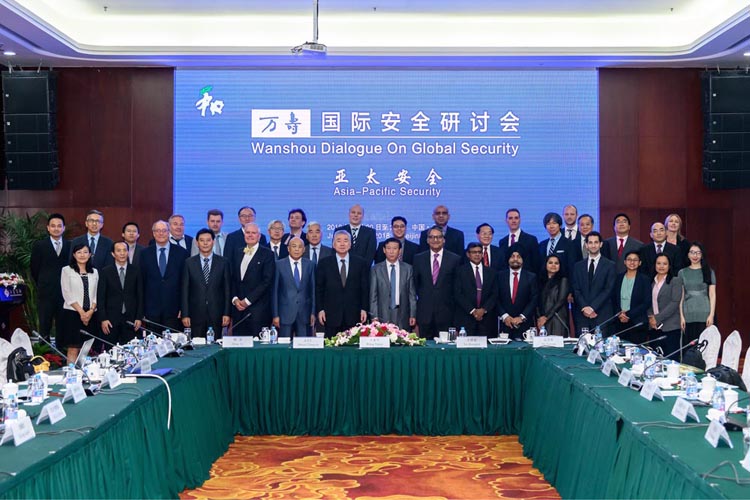The Chinese People’s Association for Peace and Disarmament organised the first Wanshou Dialogue on the Global Security on 20-21 June 2018. The deliberations were divided into three sections: Sino-US Relations and the Asia-Pacific Security Situation; Security Situation in Northeast Asia and its Prospect; and Security Mechanism Building in the Asia-Pacific Region.
The conference had a wide representation from across the World: Pakistan, South Korea, Russia, Thailand, the US, Vietnam, Switzerland, Japan, the Philippines, Sri Lanka, Malaysia, Mongolia, Canada, Indonesia and Germany. Representatives from Stockholm International Peace Research Institute (SIPRI) and the International Institute of Strategic Studies (IISS) were also present. Research Scholars from China Institute of Contemporary International Relations, Chinese Institute of International Studies and Chinese Academy of Social Sciences participated in the discussion. Fu Ying, Vice Chairperson, Foreign Affairs Committee of the National People’s Congress and Song Tao, minister of the International Department of the CPC Central Committee delivered speeches at the conference.
The salient points that emerged from the conference are as follows:
Sino-US relations
The participant from the United States (US) pointed there are structural issues in Sino-US relations. Both the countries are getting involved in an unnecessary trap and presently, they are locked in a spiral that is of low level. Invariably, they are interested in maintaining the peace in the region because, in turn, it affects their security too.
The Chinese representatives highlighted that with the coming of Donald Trump to power the bilateral relations have been strained. They further alluded to the conclusions drawn in the National Security Strategy released in December 2017 and mentioned that this is the great power politics which is not being managed. History has shown that both the countries have chosen to cooperate and it is the only common sense. Any confrontation will only retard the development in the region.
The US representative called for a comprehensive dialogue to clear the misperception and misgiving in the bilateral relations. Overall, there was a general consensus that the Sino-US relations have an uncertain future and both the sides will have to be pragmatic in dealing with each other.
The South China Sea
In the context of the South China Sea, the Chinese participant highlighted that there is a difference between Freedom of Navigation (FON) and Freedom of Navigation Operation (FONOP). On the pretext of FONOP, the US has conducted several FONOP; especially during the Donald Trump administration that China finds provocative.
The US participants mentioned that there has been a massive build-up by Chinese navy both in quantity and quality. In the last two years, tensions have grown in the region. The concept of Joint Development Approach (JDA) that is often proposed by China in the region is actually ‘no development for anyone’. It’s a way for China to restrain other countries from drilling.
Discussions were held on maintaining the peace and stability in the region. The US participant indicated that both the sides will have to take the onus for maintaining peace and stability in the region. It is perceived by the US that China is trying to push it from East Asia. Perhaps, if China can convince the US about its intentions in the region, the US may reconsider its stand on China. These developments will take some time for which China needs to have patience and should not expect “too much too soon”. On the other hand, it is the US responsibility that it does not block ‘China Rise’ in the region.
The Korean Peninsula
The meeting between Kim Jong-un and Moon Jae-in, in April and the meeting between Kim Jong-un and Donald Trump in Singapore are indeed “historical” although they had limited outcome. During the discussion, it was pointed out that the Panmunjom Declaration is the common denominator in the entire development. The participants highlighted that the pressure does not bring countries to negotiating table. There were combinations of factors that brought Kim Jong-un to the negotiating table. Suspension of the military exercise by the US is a sign of good-will. However, there should be a time-frame for the North Korea to fasten its denuclearisation may within 1-2 years.
Deliberations were held on the future of the Korean Peninsula. There was an overall consensus that it will be fascinating to see the unfolding of the developments in the region; it marks the beginning of a new end. As North Korea moves towards being a normal state it will look for alliances and partners. It was also argued that North Korea may move on the path of “Developmental Dictatorship” and Kim Jong-un may be the next Deng Xiaoping or the Gorbachev.
The discussions highlighted that the series of events scheduled in the region (Winter Olympics 2018 in PyeongChang, South Korea, Japan 2020 and 2021 Winter Olympics in China) will further unite the countries of the region. Overall, there was optimism on the developments of the Korean Peninsula.
Indo-Pacific and the Quadrilateral Security Dialogue
The participants from China argued that the concept of Indo-Pacific is an answer to China’s Belt and Road Initiative. The US has initiated the concept of Indo-Pacific but has not really invested in the concept. They further highlighted that the Quadrilateral Security Dialogue is directed toward one country.
The US participant highlighted that India is critical for Indo-Pacific strategy.
The Community of Shared Destiny
The scholars from China reiterated the concept of “community of shared destiny”. Xi Jinping in the 19th National Congress of the Communist Party of China has highlighted the concept. They reiterated that the Belt and Road Initiative is essentially an economic initiative and a popular common good. Pakistan is the biggest beneficiary of the concept of the “Community of Shared Destiny”. In conclusion, it was discussed that many security issues have their roots in the economic problem.
Security Mechanism Building in the Asia Pacific Region
All the countries of the region have different perception about the security mechanism in the region. The old security mechanism has broken down while the new one has not taken off. Hence, there is a need for International Joint Commission that is denationalised and localised. The new structure should give importance to the countries of the Association of Southeast Asian Nation (ASEAN) and give primacy to the crisis prevention and crisis avoidance mechanism in the region.










Post new comment